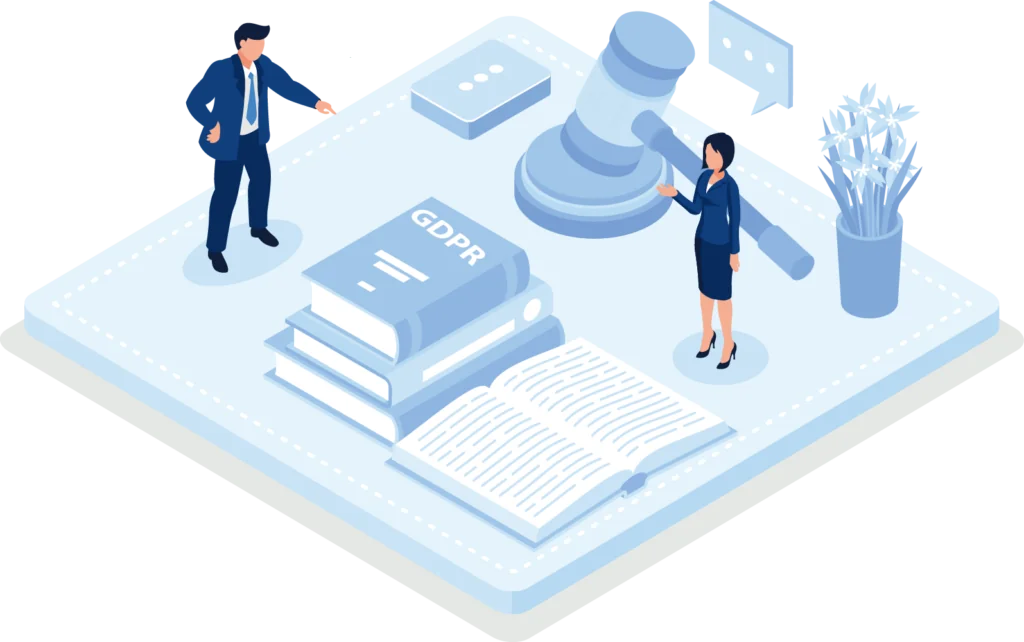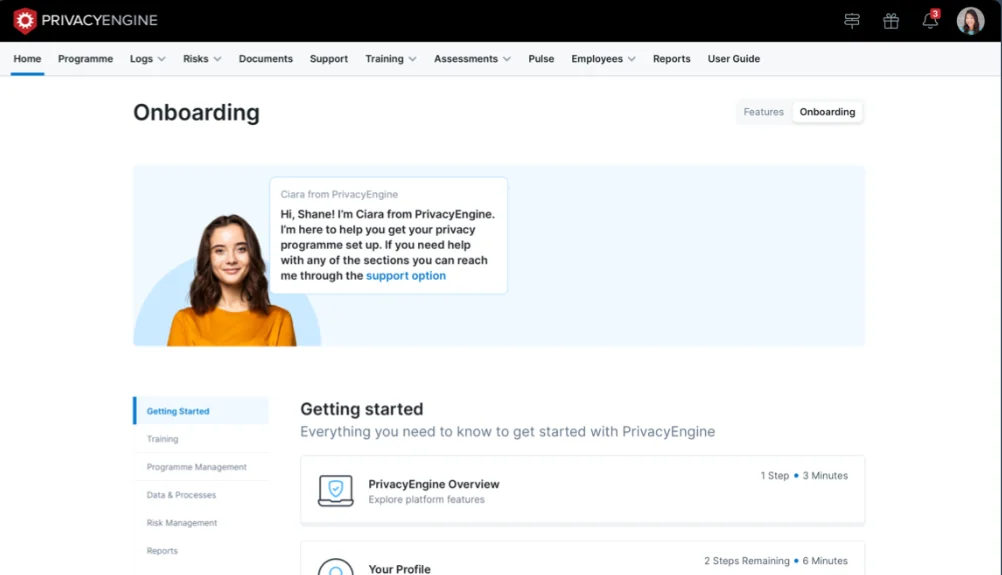The General Data Protection Regulation (GDPR) has brought significant changes to how businesses handle and protect personal data. As the consequences of non-compliance can be severe, many organizations are seeking the assistance of GDPR consultants to ensure they meet the requirements and safeguard their data effectively. However, finding the right GDPR consultant for your business can be a daunting task. In this article, we will explore the key aspects to consider when selecting a consultant and provide insights into effectively working with them to achieve GDPR compliance.
Understanding the Role of a GDPR Consultant
A GDPR consultant plays a crucial role in helping businesses navigate the complexities of the regulation and implement effective data protection practices. They possess extensive knowledge and expertise in GDPR compliance and can provide valuable guidance tailored to your specific organization. Understanding their responsibilities and the importance of GDPR compliance is vital to make informed decisions when selecting a consultant.
When it comes to data protection, businesses face numerous challenges in understanding and implementing the requirements set forth by the General Data Protection Regulation (GDPR). This regulation, which came into effect in May 2018, aims to protect the privacy and personal data of individuals within the European Union (EU). However, complying with GDPR can be a daunting task for organizations, especially those that handle large volumes of personal data.
Key Responsibilities of a GDPR Consultant
A GDPR consultant will assist your business in various areas to ensure compliance with the regulations. They will assess your current data protection measures, identify gaps, and recommend strategies to address them. This comprehensive evaluation will involve reviewing your data processing activities, data storage practices, and data transfer procedures to identify any potential risks or vulnerabilities.
Once the assessment is complete, the consultant will guide you in implementing policies and procedures that align with GDPR requirements. This may include developing a data protection policy, creating data retention schedules, and establishing procedures for handling data subject requests. By working closely with your organization, the consultant will help you establish a robust data protection framework that meets the requirements of GDPR.
Another crucial responsibility of a GDPR consultant is to assist with data breach response plans. In the event of a data breach, the consultant will help you develop an incident response plan, which includes notifying the relevant authorities and affected individuals within the required timeframes. They will also guide you through the process of conducting a thorough investigation to determine the cause of the breach and implement corrective measures to prevent future incidents.
The consultant will also play a vital role in training your employees on GDPR awareness. They will provide educational sessions and workshops to ensure that your staff understands their responsibilities when handling personal data. This training will cover topics such as data minimization, consent management, and the importance of maintaining data security.
The Importance of GDPR Compliance for Businesses
GDPR compliance is essential for businesses of all sizes and industries. Non-compliance can result in severe penalties, including significant fines and reputational damage. The GDPR has the power to impose fines of up to €20 million or 4% of a company’s global annual turnover, whichever is higher. These penalties serve as a strong deterrent for organizations to take data protection seriously.
Complying with GDPR demonstrates your commitment to protecting the privacy rights of individuals and builds trust with your customers. When customers know that their personal data is being handled in a secure and responsible manner, they are more likely to engage with your business and share their information. This can lead to increased customer loyalty and enhanced brand reputation.
Furthermore, aligning your data protection practices with GDPR’s principles promotes efficiency, security, and responsible handling of personal data, ultimately benefiting your business in the long run. By implementing robust data protection measures, you reduce the risk of data breaches, which can result in financial losses, legal liabilities, and damage to your reputation.
In conclusion, a GDPR consultant plays a vital role in helping businesses navigate the complexities of GDPR compliance. Their responsibilities include assessing current data protection measures, guiding the implementation of policies and procedures, training employees on GDPR awareness, and assisting with data breach response plans. Complying with GDPR is crucial for businesses to avoid penalties, build trust with customers, and promote efficient and secure data handling practices.
Identifying Your Business’s GDPR Needs
Before selecting a GDPR consultant, it’s crucial to identify your organization’s specific GDPR needs. Assessing your current data protection measures and determining your GDPR compliance level will help you understand the scope of changes required and the level of expertise you require from a consultant.
Assessing Your Current Data Protection Measures
Begin by conducting a comprehensive review of your existing data protection practices. Evaluate your data collection methods, data storage, systems, and processes to identify areas that may pose risks or require improvements. Understanding your current practices will enable the consultant to provide tailored guidance and recommendations.
During this assessment, it is important to consider the types of personal data your organization collects and processes. Personal data can include names, addresses, email addresses, phone numbers, financial information, and even IP addresses. Understanding the nature and sensitivity of the personal data you handle will help you determine the appropriate level of protection required under the GDPR.
Additionally, it is essential to evaluate the security measures you have in place to protect personal data from unauthorized access, loss, or theft. This includes assessing the effectiveness of your firewalls, encryption methods, access controls, and employee training programs. Identifying any gaps or weaknesses in your data protection measures will be crucial in ensuring GDPR compliance.
Determining Your GDPR Compliance Level
Evaluate your level of compliance with GDPR requirements by conducting a gap analysis. This assessment will help you identify where you stand concerning key aspects such as data security measures, data subject rights fulfillment, and data retention policies. Knowing your compliance level will help you set realistic goals and find a consultant with expertise in addressing your specific compliance gaps.
When conducting a gap analysis, it is important to consider the rights of data subjects as outlined in the GDPR. These rights include the right to be informed, the right to access personal data, the right to rectification, the right to erasure, the right to restrict processing, the right to data portability, and the right to object. Assessing your organization’s ability to fulfill these rights will give you a clear understanding of your compliance level.
Furthermore, evaluating your data retention policies is crucial in determining GDPR compliance. The GDPR requires organizations to retain personal data only for as long as necessary for the purposes for which it was collected. Assessing your data retention practices will help you identify any areas where adjustments are needed to align with GDPR requirements.
By conducting a thorough assessment of your current data protection measures and determining your GDPR compliance level, you will be well-equipped to select a GDPR consultant who can provide the expertise and guidance necessary to ensure your organization’s compliance with the GDPR.
Selecting the Right GDPR Consultant
Choosing the right GDPR consultant for your business is essential to ensure a successful compliance journey. Consider the following factors when making your selection:
Essential Qualifications to Look For
Look for consultants with relevant certifications, such as Certified Information Privacy Professional (CIPP) or Certified Data Protection Officer (CDPO). These qualifications demonstrate their knowledge and understanding of the GDPR requirements. Additionally, consider their educational background and industry experience to ensure they possess the necessary expertise to guide your organization.
When evaluating the qualifications of a GDPR consultant, it is crucial to look beyond the certifications. While certifications provide a baseline level of knowledge, they do not guarantee practical experience or a deep understanding of your specific industry. A consultant with a diverse educational background and extensive industry experience can bring valuable insights and tailored solutions to your compliance journey.
Furthermore, consider the consultant’s ongoing professional development. The GDPR landscape is constantly evolving, and it is essential for consultants to stay up-to-date with the latest regulations, guidelines, and best practices. Look for evidence of their commitment to continuous learning, such as attending relevant conferences, participating in industry forums, or publishing thought leadership articles.
Evaluating Experience and Expertise
Assess the consultant’s track record of successfully helping businesses achieve GDPR compliance. Request case studies or testimonials from their previous clients to understand their approach and the outcomes they delivered. It’s also beneficial to inquire about their familiarity with your industry and the size of businesses they have worked with before.
Consider the complexity of your organization’s data processing activities and the industry-specific challenges you may face. A consultant who has experience working with similar organizations can provide valuable insights and practical solutions tailored to your specific needs. They will have a deep understanding of the intricacies involved in your industry and can help you navigate the complexities of GDPR compliance more effectively.
Furthermore, evaluate the consultant’s approach to compliance. Look for evidence of a holistic and proactive approach that goes beyond mere checkbox compliance. A consultant who emphasizes building a culture of privacy and data protection within your organization can help ensure long-term compliance and minimize the risk of data breaches.
Lastly, consider the consultant’s ability to communicate effectively and build strong relationships with stakeholders at all levels of your organization. GDPR compliance requires collaboration and cooperation across departments, and a consultant who can effectively engage with your teams can facilitate a smoother compliance journey.
Working Effectively with Your GDPR Consultant
Collaborating effectively with your chosen GDPR consultant is essential to achieve successful compliance. Establishing clear expectations, goals, and maintaining open lines of communication will ensure a productive working relationship.
When embarking on a GDPR compliance journey, it is crucial to set clear expectations and goals with your consultant. Clearly communicate your organization’s objectives and expectations to the consultant from the outset. By doing so, you can align your consultant’s expertise with your specific needs and ensure that everyone is on the same page.
Defining the scope of your consultant’s involvement is another critical aspect of setting clear expectations. Clearly outline the areas where you need their expertise and guidance. Whether it’s data mapping, conducting privacy impact assessments, or developing policies and procedures, make sure your consultant understands the extent of their responsibilities.
Additionally, discussing expected deliverables and timelines is essential. By setting specific targets and deadlines, you can monitor progress and ensure that the project stays on track. This clarity will help both parties stay focused and work towards achieving the desired outcomes.
Maintaining Open and Regular Communication
Regular and open communication is the key to a successful working relationship with your GDPR consultant. It is crucial to establish a communication plan from the beginning and ensure that all parties are aware of the channels and frequency of communication.
Regularly communicate with your GDPR consultant to stay updated on progress and address any concerns or questions promptly. By maintaining open lines of communication, you can address any potential issues or roadblocks before they become significant problems. This proactive approach will save time and resources in the long run.
It is also important to involve your internal stakeholders in the communication process. By including key individuals from different departments, you can foster a culture of compliance throughout the organization. This collaboration will help ensure that everyone understands the importance of GDPR compliance and is actively engaged in the process.
Regular meetings and status updates are essential for keeping everyone informed and engaged. These meetings provide an opportunity to discuss progress, address any challenges, and make necessary adjustments to the compliance strategy. By maintaining a regular cadence of communication, you can ensure that everyone is on the same page and working towards the common goal of GDPR compliance.
In conclusion, working effectively with your GDPR consultant requires setting clear expectations, goals, and maintaining open lines of communication. By clearly communicating your organization’s objectives, defining the scope of their involvement, and aligning goals, you can ensure a productive working relationship. Additionally, regular and open communication with your consultant and internal stakeholders will foster a culture of compliance and keep everyone informed and engaged.
Measuring the Success of Your GDPR Compliance Efforts
After implementing GDPR compliance measures with the assistance of a consultant, it is important to measure the success and efficacy of your efforts. Ensuring that your organization is compliant with the General Data Protection Regulation (GDPR) is crucial for maintaining customer trust, avoiding hefty fines, and protecting sensitive data.
Regular Audits and Reviews
Regularly conduct internal audits and reviews to evaluate the effectiveness of your data protection practices. These assessments will help identify any deficiencies or areas that require further improvement. Engage with your GDPR consultant to assist in the audit process and provide insights on strengthening your compliance efforts.
During these audits, it is essential to thoroughly examine your data handling processes, consent management, data breach response procedures, and data subject rights management. By conducting comprehensive audits, you can identify any potential vulnerabilities or gaps in your compliance program.
Furthermore, consider incorporating automated tools and technologies that can assist in the audit process. These tools can help streamline data discovery, classification, and monitoring, making it easier to identify and rectify any compliance issues.
Understanding the Impact on Your Business Operations
Assess how GDPR compliance has impacted your business operations, cybersecurity posture, and customer trust. Review any changes made to your processes and evaluate their effectiveness and efficiency. Seek feedback from your employees and customers to gauge their perception and ensure ongoing compliance.
One way to measure the impact of GDPR compliance on your business operations is by analyzing key performance indicators (KPIs). These KPIs can include metrics such as the number of data subject requests received, response times, and the effectiveness of your data breach response procedures. By tracking these metrics over time, you can identify trends and areas for improvement.
Additionally, consider conducting regular employee training sessions to ensure that your staff is well-informed about GDPR requirements and best practices. This will not only help maintain compliance but also foster a culture of data protection within your organization.
Furthermore, it is important to regularly communicate with your customers regarding their data privacy rights and how their information is being handled. This transparency will help build trust and confidence in your organization’s commitment to GDPR compliance.
In conclusion, measuring the success of your GDPR compliance efforts requires a comprehensive approach that includes regular audits, reviews, and an understanding of the impact on your business operations. By continuously evaluating and improving your compliance program, you can ensure ongoing adherence to GDPR requirements and maintain the trust of your customers.
Conclusion
Selecting the right GDPR consultant is crucial in ensuring your business meets the requirements and achieves successful GDPR compliance. By understanding the role of a GDPR consultant, identifying your organization’s specific needs, and working effectively with the consultant, you can navigate the complexities of GDPR implementation with confidence. Regular audits and reviews will help you measure the success of your compliance efforts and continuously improve your data protection practices. Taking these steps will enable your business to establish a solid foundation for protecting personal data and maintaining the trust of your customers in the ever-evolving digital landscape.




